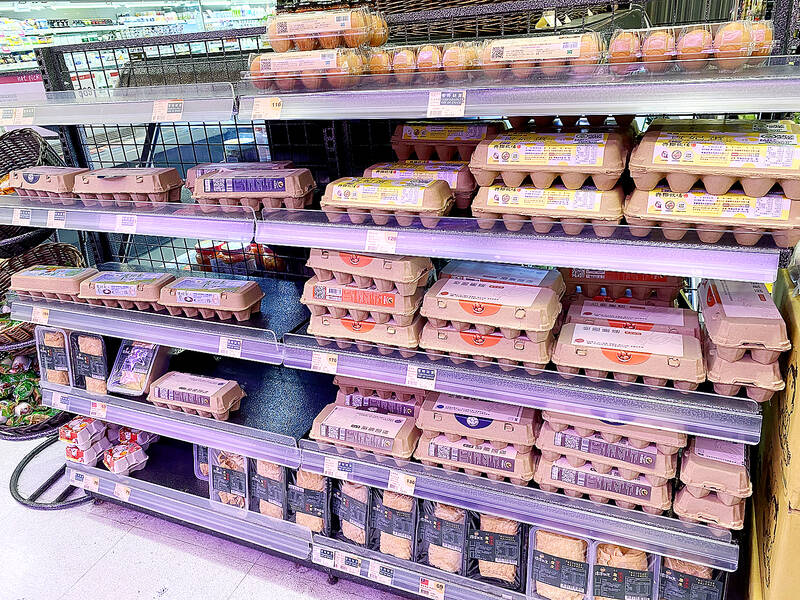The consumer price index (CPI) last month gained 2.75 percent year-on-year, mainly because of spikes in food prices amid bad weather, the Directorate-General of Budget, Accounting, and Statistics (DGBAS) said yesterday.
Last month’s growth was steeper than the 2.66 percent gain in August, beating some analysts’ expectations that inflation has been tamed.
Heavy rains induced by typhoons and tropical storms resulted in supply disruptions, but related agricultural damage was limited in scale, DGBAS official Tsao Chih-hung (曹志弘) told a news conference in Taipei.

Photo: Clare Cheng, Taipei Times
“The pickup in inflation is transitory, caused by bad weather that sent vegetable prices up 12.05 percent from one month earlier,” Tsao said.
The effects of the weather events is expected to ease this month, the official said.
Inflation should have peaked in the second quarter of this year and is expected to further subdue this quarter, Tsao said.
Food prices last month advanced 5.3 percent from a year earlier, accounting for 50 percent of the CPI increase, the DGBAS said.
Food cost increases made people feel the pinch sharply, as prices of frequently purchased items picked up 5.84 percent, the most rapid hike in eight years, Tsao said.
Clothing prices rose 3.56 percent, as retailers offered fewer discounts than they did last year, the DGBAS said.
Transportation and communication costs rose 2.24 percent, as international oil prices grew 3.31 percent, it said.
The cost increase for imported commodities slowed in US dollar terms, but widened nearly 20 percent in New Taiwan dollar terms, because the local currency depreciated against the greenback, Tsao said.
As international oil prices are expected to stabilize, imported inflation would be kept at bay, he said.
The core CPI, a more reliable long-term price tracker because it excludes volatile items, last month climbed 2.79 percent annually, up from 2.74 percent in August, government data showed.
The wholesale price index (WPI), a measure of commercial production costs, increased 12.82 percent annually, up from 11.11 percent in August, as exports and imports became more expensive, the DGBAS said.
The agency is to stop compiling WPI data next year, replacing it with a producer price index to reflect production cost movements, it said.
For the first nine months of this year, the CPI was up 3.06 percent, while the WPI rose 13.7 percent, the DGBAS said.

Sweeping policy changes under US Secretary of Health and Human Services Robert F. Kennedy Jr are having a chilling effect on vaccine makers as anti-vaccine rhetoric has turned into concrete changes in inoculation schedules and recommendations, investors and executives said. The administration of US President Donald Trump has in the past year upended vaccine recommendations, with the country last month ending its longstanding guidance that all children receive inoculations against flu, hepatitis A and other diseases. The unprecedented changes have led to diminished vaccine usage, hurt the investment case for some biotechs, and created a drag that would likely dent revenues and

Global semiconductor stocks advanced yesterday, as comments by Nvidia Corp chief executive officer Jensen Huang (黃仁勳) at Davos, Switzerland, helped reinforce investor enthusiasm for artificial intelligence (AI). Samsung Electronics Co gained as much as 5 percent to an all-time high, helping drive South Korea’s benchmark KOSPI above 5,000 for the first time. That came after the Philadelphia Semiconductor Index rose more than 3 percent to a fresh record on Wednesday, with a boost from Nvidia. The gains came amid broad risk-on trade after US President Donald Trump withdrew his threat of tariffs on some European nations over backing for Greenland. Huang further

CULPRITS: Factors that affected the slip included falling global crude oil prices, wait-and-see consumer attitudes due to US tariffs and a different Lunar New Year holiday schedule Taiwan’s retail sales ended a nine-year growth streak last year, slipping 0.2 percent from a year earlier as uncertainty over US tariff policies affected demand for durable goods, data released on Friday by the Ministry of Economic Affairs showed. Last year’s retail sales totaled NT$4.84 trillion (US$153.27 billion), down about NT$9.5 billion, or 0.2 percent, from 2024. Despite the decline, the figure was still the second-highest annual sales total on record. Ministry statistics department deputy head Chen Yu-fang (陳玉芳) said sales of cars, motorcycles and related products, which accounted for 17.4 percent of total retail rales last year, fell NT$68.1 billion, or

HSBC Bank Taiwan Ltd (匯豐台灣商銀) and the Taiwan High Prosecutors Office recently signed a memorandum of understanding (MOU) to enhance cooperation on the suspicious transaction analysis mechanism. This landmark agreement makes HSBC the first foreign bank in Taiwan to establish such a partnership with the High Prosecutors Office, underscoring its commitment to active anti-fraud initiatives, financial inclusion, and the “Treating Customers Fairly” principle. Through this deep public-private collaboration, both parties aim to co-create a secure financial ecosystem via early warning detection and precise fraud prevention technologies. At the signing ceremony, HSBC Taiwan CEO and head of banking Adam Chen (陳志堅)